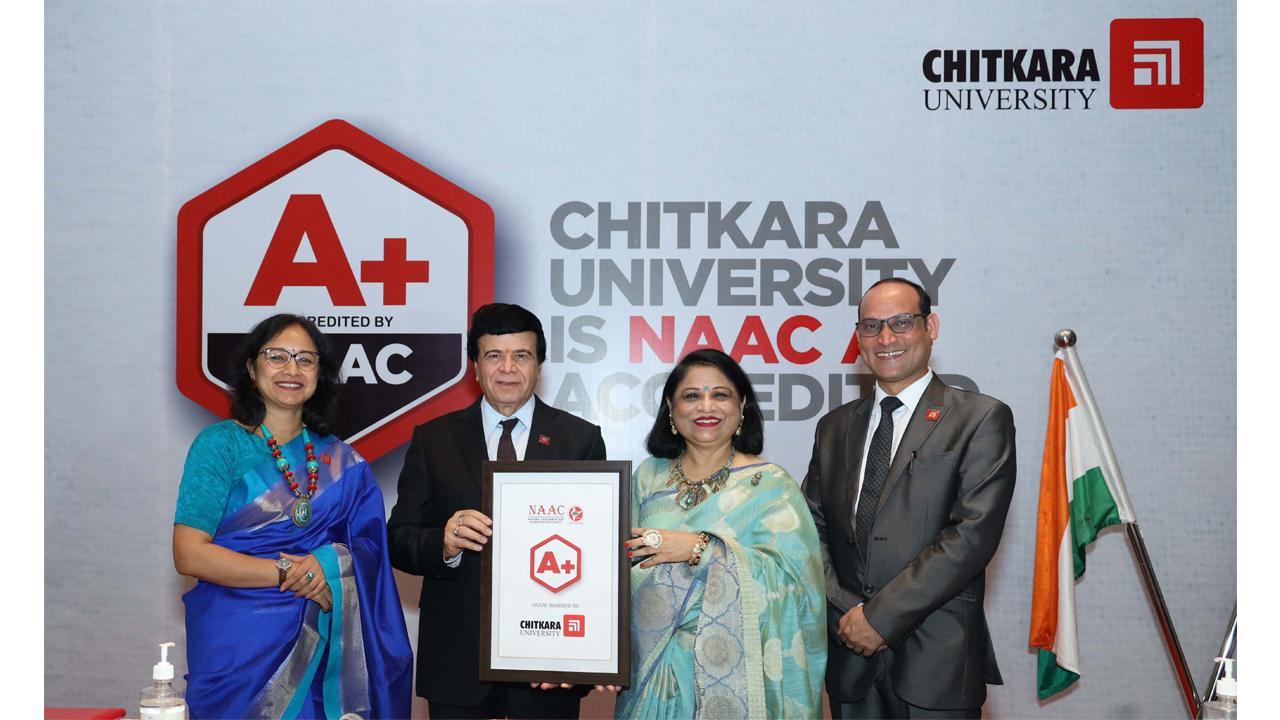Chitkara University has been praised for its three major features by the Peer Team. They are: good infrastructure for education innovation and research; neat and clean, green, and well-maintained campus; and the location of the institute is in a well-developed urban area with good placement opportunities.

Chitkara University
Chitkara University has been awarded the rating of A+ by the prestigious National Assessment and Accreditation Council (NAAC), which places it among the 5% Higher Education Institutions (HEI) in India to be granted such a coveted grade. The University scored a Cumulative Grade Point Average (CGPA) of 3.26 on 4 point scale.
ADVERTISEMENT
The University has been praised for its three major features by the Peer Team. They are: good infrastructure for education innovation and research; neat and clean, green, and well-maintained campus; and the location of the institute is in a well-developed urban area with good placement opportunities.
On the occasion, Dr Ashok K Chitkara, Chancellor of Chitkara University said, “It is the hard-work by our students, staff and faculty for years that resulted in securing this recognition. Moreover, the university has a well-defined research promotion policy which has resulted into the development of state-of-the-art advanced facilities. CURIN has multi-disciplinary advanced facilities supported by research funding from Government agencies such as DST, DRDO, etc. to the tune of 37.24 crore. The research scholars and faculties are provided seed money for undertaking research and filing patents.”
Pro Chancellor Dr Madhu Chitkara expressed her sincere thanks to all stakeholders and said, “The curricula are developed following standardised procedures and is revised at regular intervals by taking feed backs from all our stake holders. The local, regional, and global developmental needs regarding employability and entrepreneurship are considered while designing the course. The experimental, participative, and project-based learning are in practice through blended mode. We have adopted flexible CBCS System that gives freedom to the students to undergo multidisciplinary approach. The assessment process is well defined to evaluate the attainment level in critical thinking and problem solving skill through programme specific learning.”
Established in 1994, NAAC is an autonomous body of UGC which assesses and accredits Higher Education Institutions (HEIs). NAAC has identified a set of seven criteria to serve as the basis of its assessment procedures: Curricular Aspects; Teaching-learning & Evaluation; Research, Innovations & Extension; Infrastructure & Learning Resources; Student Support & Progression; Governance, Leadership & Management; and Institutional Values & Best Practices.
By studying in an institution that is NAAC accredited, students get a chance to learn in a cutting-edge environment and earn a degree that would have global recognition. They get instant recognition of an alumnus of a credible institute and get better placement opportunities as the industry prefers hiring with higher-graded institutions.
The university through NAAC accreditation gets to know its strengths, weaknesses, and opportunities through an informed review process. The higher NAAC Grade of the university promotes various intra & inter-institutional interactions.
Vice Chancellor Dr Archana Mantri said, “The University practices Global Week for students/faculties exchange programme with foreign academic institution. Various dynamic collaborations have been established through the internationally funded research projects, international conferences and cultural immersion across the campus. A significant number of Global experts (250), students (25000) have been impacted through this best practice.”
Dr K K Mishra, Director Accreditation & Quality Assurance Cell, said “In the old scheme, before 2017, the whole evaluation was based on an overhauled visit by peer team and now under the current process, 70% of the evaluation is based on data from the institution and university that is evaluated by a third party that makes it even harder and stricter to be accredited.”
 Subscribe today by clicking the link and stay updated with the latest news!" Click here!
Subscribe today by clicking the link and stay updated with the latest news!" Click here!






